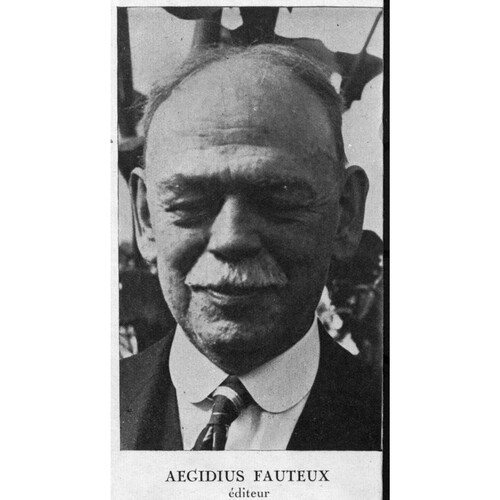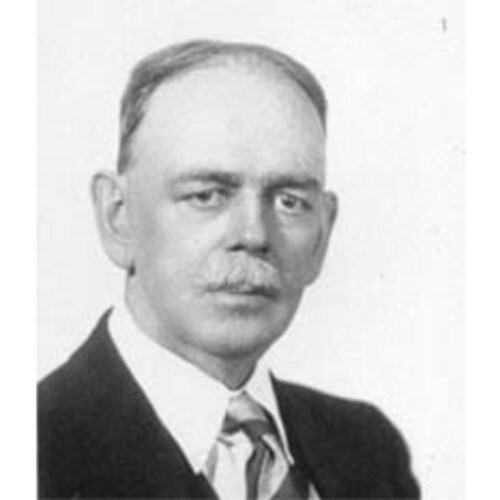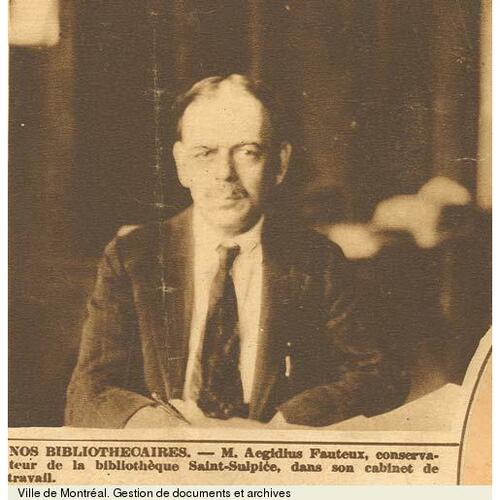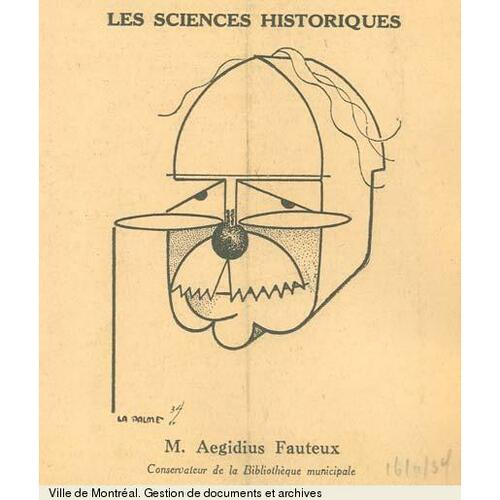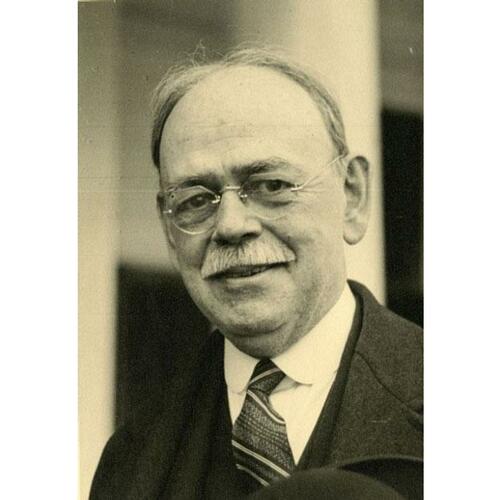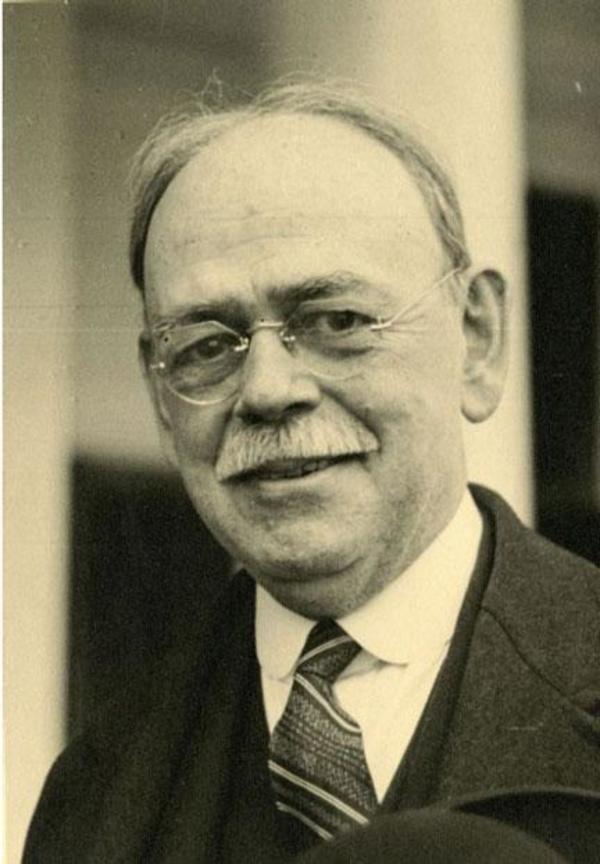
Source: Link
FAUTEUX, ÆGIDIUS (baptized Oscar-Egidius), journalist, editor-in-chief, librarian, historian, and teacher; b. 27 Sept. 1876 in the parish of Saint-Joseph, Montreal, son of Hercule Fauteux, a carpenter, and Exilda Dagenais; m. 27 Feb. 1911 Antonia Chevrier (d. 13 May 1927) in the parish of Saint-Pierre-Apôtre, Montreal, and they adopted a daughter, Marie-Laure Fauteux; d. there 22 April 1941 and was buried four days later in the city’s Notre-Dame-des-Neiges cemetery.
Education and early cultural activity
After attending elementary school in Sainte-Cunégonde (Montreal), Ægidius Fauteux pursued classical studies with the Sulpicians at the Petit Séminaire de Montréal (1887–93) and then at the Séminaire de Philosophie (1893–95), receiving his baccalauréat ès arts from the Université Laval in Montreal. He embarked upon theological training at the Grand Séminaire de Montréal and earned a degree in 1898. Convinced, however, that he was not called to the priesthood, he subsequently enrolled in the Université Laval’s law faculty (1899–1903). Admitted to the Quebec bar on 10 July 1903, he decided against a legal career and never practised.
During his academic years, Fauteux won first prize in the university’s French literature competition in 1900 and 1901. In 1901–2 he was president of the Cercle Ville-Marie [see Ignace Bourget*], which was supported by the Sulpicians and where he had held other positions from 1897 to 1902. He also gave a few lectures, speaking in particular on the prominent contemporary Parisian journalists Paul Granier de Cassagnac, Édouard Drumont, and Henri Rochefort in December 1900; on French Canada and foreign authors in December 1901; and on Émile Zola and his literary and social influence in October 1902. In October 1907 he gave a talk on the status of women. These endeavours attracted the attention of his former Sulpician teachers at the Cercle Ville-Marie, a significant Montreal cultural forum at the turn of the century.
Journalist
Before completing his studies, Fauteux was involved in journalism. Starting in 1900 he wrote his first articles for Montreal’s La Patrie, using the pseudonym M. France; he argued on 21 Dec. 1901 for the need to establish a public library in Montreal. In the article he recalled the dream of Jean-Charles-Emmanuel Nodier, librarian at the Bibliothèque de l’Arsenal in Paris, about a richly endowed library in Baghdad in which the Abbāsid caliph Hārūn al-Rachīd and his vizier, Barmakid Yahyā, repeatedly told him: “All these books are yours!” In 1902 Fauteux founded a four-page Montreal weekly, Le Rappel, with young Conservative friends, including Arthur Sauvé and Joseph-Édouard-Émile Léonard. The authors used the periodical to voice their opposition to British imperialism, to which Conservative Party leaders were sympathetic. The paper survived for less than two years (14 Sept. 1902 to 12 June 1904).
In 1905 Joseph-Israël Tarte* recruited Fauteux as parliamentary correspondent at Quebec’s Legislative Assembly for his daily, La Patrie. Fauteux held this post for four years, forming friendships with, among others, Thomas Chapais and Olivar Asselin*. In 1908 he published Dix ans de régime libéral, le gouvernement Gouin: ses faiblesses, ses abus, ses scandales, a partisan, well-documented 80-page document that appeared shortly before that year’s provincial election. He harshly criticized the Liberal government’s ten years in power and closely scrutinized its legislation. The following year he became editor-in-chief of the Montreal daily La Presse, whose circulation exceeded 100,000. This popular newspaper, which had maintained a degree of neutrality until the federal election of 1900, thereafter supported the Liberal Party of federal prime minister Sir Wilfrid Laurier* [see Sir Wilfrid Laurier]. A Conservative through and through, Fauteux was able to set aside his political convictions in the context of his job. He now possessed a wealth of journalistic experience and lent his support to the battles against opposing or rival dailies, including Le Devoir, founded in 1910 [see Henri Bourassa*]. His years as editor-in-chief left him exhausted.
Head librarian
In December 1912 Fauteux accepted, with some relief and great pleasure, the position of head of the library that the Sulpicians wanted to build in the heart of the Latin Quarter on Rue Saint-Denis. From then on, his world was centred on books and libraries, but he did not entirely abandon journalism and continued to write throughout his life. The Sulpicians gave him the necessary funds and a clear mandate to enrich the collections of their Cabinet de Lecture Paroissial and turn the new institution, the Bibliothèque Saint-Sulpice, into the best documentation centre in French-speaking America.
Fauteux capitalized on the relationships he had established with ministers, mlas, and civil servants during his time as parliamentary correspondent. In 1913 he visited major American libraries, such as the Washington Public Library, the Library of Congress, and the New York Public Library. In Washington he contacted the U.S. Government Printing Office, the Smithsonian Institution, the American Historical Association, and other institutions. On the recommendation of the head of the District of Columbia Public Library, George Franklin Bowerman, who supported him in his efforts to obtain American documents, Fauteux took advantage of his stay to become a member of the American Library Association. He made a lengthy trip (26 Sept. 1913 to 12 Jan. 1914) to Europe, primarily France, to acquire volumes to fill the shelves of the Sulpician library for its anticipated opening to the public in 1915. In Paris he visited the Bibliothèque Nationale, the Bibliothèque de l’Université de Paris à la Sorbonne, the Bibliothèque de l’Institut de France, the Bibliothèque de l’Arsenal, and the Bibliothèque d’Art et d’Archéologie. He met most of the major publishers in the Latin Quarter and established lasting, beneficial relationships with booksellers and publishers Honoré Champion and Auguste Picard, the foremost scholarly publishers in Paris. During his stay, Fauteux purchased some 50,000 volumes. He returned in 1923 to meet again with the publishers, place substantial orders, and conduct historical research at the Archives Nationales and the Archives de la Compagnie des Prêtres de Saint-Sulpice.
Greatly influenced by library management practices in the United States, Fauteux closely followed the country’s developments in library science and subscribed to publications of the American Library Association. He adopted the Dewey decimal classification system and the cataloguing rules used in the United States.
Fauteux also integrated the books from the Bibliothèque Paroissiale de Notre-Dame into his collections, as well as volumes from other Sulpician institutions such as Montreal’s Grand Séminaire and Petit Séminaire. He did not neglect the Canadian collection. He placed large orders in Montreal, especially with booksellers Gonzague Ducharme and Gérard Malchelosse*. To purchase private collections, he took advantage of the expertise of Ducharme and the archivist Édouard-Zotique Massicotte. He acquired the extensive collection of judge Louis-Wilfrid Sicotte, part of the library of politician Louis-Joseph Papineau*, the library of artist Napoléon Bourassa*, manuscripts from printer John Neilson*, and 600 Canadian incunabula belonging to Montreal bibliophile Abbé Nazaire Dubois.
Starting in the early 1920s, Fauteux made it a priority to promote Canadian books. As part of Canadian Book Week, inaugurated in 1921 and held in numerous bookshops and libraries, including the Bibliothèque Saint-Sulpice, he created a voluntary deposit program. Quebec publishers and printers gave him books to display, which subsequently enriched the Saint-Sulpice collections. This initiative allowed Fauteux to forge closer ties between the publishing world and his institution. The inventory of its volumes, prepared by Fauteux, appeared between 1923 and 1930 in the French section of the Canadian catalogue of books published in Canada, contributing to knowledge about, and the distribution of, books released in Quebec.
Serious financial problems, which became apparent around 1925 and were intensified by the Great Depression, compelled the Bibliothèque Saint-Sulpice to close its doors to the general public in 1931. This situation profoundly affected Fauteux: the institution had been his life’s work. The following year he became head librarian at Montreal’s Civic Library, a position he held until his death. There, he ensured the continuity of services that a municipal library should offer its citizens, although a reference and research library such as Saint-Sulpice was more consistent with his vision.
Other activities
Despite his retiring nature, Fauteux involved himself in a number of large organizations throughout his career. He was an active member of several learned associations and societies, such as the Numismatic and Antiquarian Society of Montreal and the Historic Sites and Monuments Board of Canada. Elected to the Royal Society of Canada in 1918, he was president of the French section in 1927–1928. From 1928 until his death he was president of the Société Historique de Montréal. A founding member of the Société des Dix in 1935, he was the editor of and an assiduous contributor to the Cahiers des Dix, published annually. The government of France named him an officier d’académie in 1930; in 1937 the Royal Society of Canada awarded him the J. B. Tyrrell Historical Medal. Along with his friends, archivists Pierre-Georges Roy* and Massicotte, and notary Victor Morin, Fauteux can be regarded as a leader of cultural life in Quebec during the first half of the 20th century.
Library science training
Fauteux was also engaged in training librarians in the province. In 1932 he had given lectures in library science in French at McGill University, and in 1937 he, librarian Marie-Claire Daveluy*, and Father Paul-Aimé Martin* founded the École des Bibliothécaires, which was affiliated with the Université de Montréal. He was its director of studies until his death. In 1936 his friend Msgr Olivier Maurault*, rector of the university, awarded him an honorary doctorate of letters in recognition of his contribution to library science in Quebec and his historical work. The distinction was also given in thanks for welcoming students to the Bibliothèque Saint-Sulpice following the fire in the university’s main building in 1919.
Historian
A prolific and respected historian, Fauteux “stood out in his generation as the best-informed researcher on history with a capital and small ‘H,’” according to historians Pierre Savard and Pierre de Grandpré. After Fauteux died in 1941, Maurault took stock of his body of work: six volumes of history, six bibliographies, about ten critical editions, numerous contributions to anthologies, periodicals, and newspapers, as well as several lectures. In 1916 Fauteux published in Montreal Les bibliothèques canadiennes: étude historique. His most significant contribution to the field of cultural history is The introduction of printing into Canada: a brief history (Montreal, 1929), published by the Rolland Paper Company [see Jean-Baptiste Rolland*]. The French version of the book was released in 1957, also in Montreal, under the title L’Introduction de l’imprimerie au Canada: une brève histoire. In 1917, in the same city, Fauteux published La famille d’Aillebout: étude généalogique et historique; other volumes devoted to the French régime followed, including Le duel au Canada and Les chevaliers de Saint-Louis en Canada (Montreal, 1934 and 1940.) For the latter, the Société Historique de Montréal awarded him a medal for the best historical study of the year and in recognition of his complete works. Appearing posthumously, Patriotes de 1837–1838 (Montreal, 1950) made a significant contribution to knowledge about the people involved in the events of those years.
In 1922 Fauteux published, in Montreal, Bibliographie de la question universitaire Laval-Montréal (1852–1921), a list of documents concerning the saga of the institution, which occupied nearly three-quarters of a century of Montreal history. His critical editions included Journal du siège de Québec du 10 mai au 18 septembre 1759 (1922), Mémoire sur les postes du Canada by Charles de Raymond (1929), and Journal de MM. Baby, Taschereau et Williams, 1776 (1929), all published in Quebec. Fauteux was also a collaborator on the critical edition of Sister Marie Morin*’s Annales de l’Hôtel-Dieu de Montréal (Montreal, 1921). He contributed regularly to the Bulletin des recherches historiques (Lévis), published by his friend Pierre-Georges Roy, and his historical columns – headed “Les carnets d’un curieux” (1933 and 1934) and “Le courrier historique et littéraire de la Patrie” (November 1935 to October 1936) – appeared in La Patrie.
Death and assessment
In March 1941 Fauteux, who had heart problems, was admitted to the Mayo Clinic in Rochester, Minn., for tests. Returning to Montreal in a weakened state, he contracted pleuropneumonia and died at the Hôpital Saint-Luc on 22 April, aged 64.
Ægidius Fauteux turned the Bibliothèque Saint-Sulpice into a Montreal cultural institution of the first rank. He made it integral to the academic world by welcoming students from the Université de Montréal, as well as university researchers and non-academics alike, while being mindful of the needs of the reading public. A great librarian, constantly searching for new techniques, Fauteux ran the Bibliothèque Saint-Sulpice and Montreal’s Civic Library with public service in mind. His contemporaries saw him as a scholar serving researchers and his fellow citizens. In 1941 the provincial government acquired the Bibliothèque Saint-Sulpice, whose collection constituted the first holdings of the Bibliothèque Nationale du Québec, created in 1967. Part of the collection was transferred to the Grande Bibliothèque, whose inaugural exhibition in April 2005 recalled the dream evoked by Fauteux: “Tous ces livres sont à toi!” (All these books are yours).
Ancestry.com, “Quebec, Canada, vital and church records (Drouin collection), 1621–1968,” Basilique Notre-Dame (Montréal), 17 mai 1927, 26 avril 1941; St-Henri (Montréal), 20 juin 1922; St-Pierre-Apôtre (Montréal), 27 févr. 1911: www.ancestry.ca/search/collections/1091/?locale=EN (consulted 31 Jan. 2022). Bibliothèque et Arch. Nationales du Québec, Centre d’arch. de Montréal, CE601-S38, 28 sept. 1876; MSS125, boîtes 1–7; P32, S1, SS1, D31. Univ. de Montréal, Div. des arch., P0030. Univers Culturel de Saint-Sulpice (Montréal), Dép. des arch., C2 (collection Ægidius Fauteux): B.14 (corr. Ægidius Fauteux. – 1900–1919); P1 (fonds Prêtres de Saint-Sulpice de Montréal), 11 (enseignement), 6 (Université de Montréal), 140. Le Devoir (Montréal), 23, 28 avril 1941. “Ægidius Fauteux,” La Rev. du Barreau de la prov. de Québec (Montréal), 1 (1941): 106. Robert Baillargeon, Ægidius Fauteux, bibliophile et homme de lettres: étude monographique (Laval, Québec, 1992). Biographies canadiennes-françaises, J.‑A. Fortier, édit. (Ottawa), 1920: 46. J.‑R. Brault, “La collection Saint-Sulpice de la Bibliothèque nationale du Québec,” Cahiers d’hist. du Québec au XXe siècle (Outremont [Montréal]), no.2 (été 1994): 11–26. Gilles Gallichan, “Le troisième fauteuil: Ægidius Fauteux, Léo-Paul Desrosiers, Luc Lacourcière,” Les Cahiers des Dix (Québec), 51 (1996): 55–76. Réginald Hamel et al., Dictionnaire des auteurs de langue française en Amérique du Nord (Montréal, 1989), 500–1. Marcel Lajeunesse, “Ægidius Fauteux, la collection Saint-Sulpice et le livre français, 1912–1931,” dans Passeurs d’histoire(s): figures des relations France–Québec en histoire du livre, sous la dir. de M.‑P. Luneau et al. (Québec, 2010), 251–64; “The contribution of Ægidius Fauteux and Edmond Desrochers to Quebec librarianship in the twentieth century,” Information & Culture (Austin, Tex.), 47 (2012): 340–57; Les Sulpiciens et la vie culturelle à Montréal au XIXe siècle (Montréal, 1982). J.‑R. Lassonde, “La Bibliothèque Saint-Sulpice, de 1910 à 1931” (mémoire de ma, Univ. de Montréal, 1985). Olivier Maurault, “Ægidius Fauteux,” Les Cahiers des Dix (Montréal), 6 (1941): 9–18; “Ægidius Faucheux (1876–1941),” Royal Soc. of Can., Trans. (Ottawa), 3rd ser., 35 (1941), app.B: 103–11. Ont., Dept. of Education, Public libraries branch, The Canadian catalogue of books published in Canada: books about Canada, as well as those written by Canadians, during 1921 and 1922–1949 ([Toronto]), 1923–1950, 3 pts. in 28v. The Oxford companion to Canadian history and literature, ed. Norah Story (Toronto, 1967). Michel Pierssens et Roberto Benardi, “L’écho des jeunes: une avant-garde inachevée,” Études françaises (Montréal), 32 (1996): 21–50. Pierre Savard et Pierre de Granpré [Grandpré], “L’histoire, de 1900 à 1930,” dans Histoire de la littérature française du Québec, sous la dir. de Pierre de Grandpré (4v., Montréal, 1967–69), 2 (1900–1945): 134–48. “Tous ces livres sont à toi!”: de l’œuvre des bons livres à la Grande Bibliothèque (1844–2005) (catalogue d’exposition, Bibliothèque Nationale du Québec, [Montréal et Québec], 2005).
Cite This Article
Marcel Lajeunesse, “FAUTEUX, ÆGIDIUS (baptized Oscar-Egidius),” in Dictionary of Canadian Biography, vol. 17, University of Toronto/Université Laval, 2003–, accessed April 24, 2025, https://www.biographi.ca/en/bio/fauteux_aegidius_17E.html.
The citation above shows the format for footnotes and endnotes according to the Chicago manual of style (16th edition). Information to be used in other citation formats:
| Permalink: | https://www.biographi.ca/en/bio/fauteux_aegidius_17E.html |
| Author of Article: | Marcel Lajeunesse |
| Title of Article: | FAUTEUX, ÆGIDIUS (baptized Oscar-Egidius) |
| Publication Name: | Dictionary of Canadian Biography, vol. 17 |
| Publisher: | University of Toronto/Université Laval |
| Year of revision: | 2022 |
| Access Date: | April 24, 2025 |


